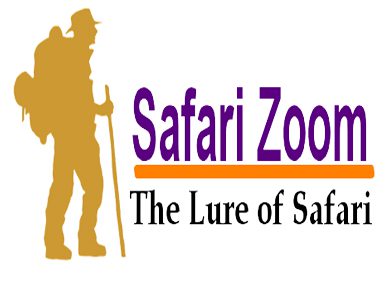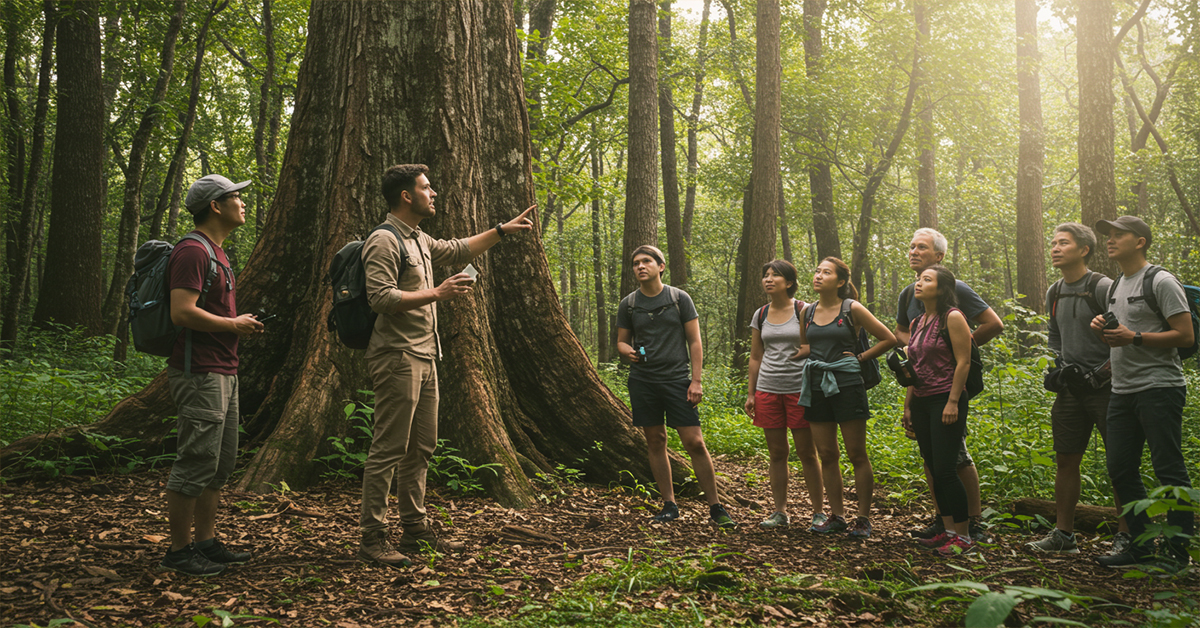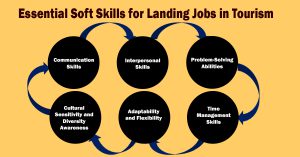How to Market Yourself as a Sustainable Tourism Expert
Sustainable tourism is no longer just a niche—it’s a fast-growing segment of the travel industry. According to the Virtue Market Research report, In 2023, the Global Sustainable Tourism Market was valued at $2.5 trillion and is projected to reach a market size of $6.26 trillion by 2030.
This means that travellers are becoming increasingly eco-conscious, offering immense opportunities for professionals in this space. But how do you position yourself as an expert in sustainable tourism? Let’s explore the steps to make it happen.
Understanding Sustainable Tourism
Definition and Core Principles of Sustainable Tourism
Sustainable tourism emphasizes minimizing environmental damage, supporting local communities, and preserving cultural heritage while promoting responsible travel. Key principles include:
- Environmental sustainability: Reducing carbon footprints and preserving natural resources.
- Socio-cultural sustainability: Ensuring local communities benefit economically and culturally.
- Economic sustainability: Supporting long-term viability for businesses and destinations.
These principles resonate with a growing audience. According to Booking.com’s 2023 Sustainable Travel Report, 76% of travellers want to make more sustainable travel choices, but 44% don’t know where to start. This gap is an opportunity for experts like you to step in and guide them.
Why Sustainable Tourism Matters in Today’s World
According to Carbon Brief, the tourism industry accounts for 8% of global greenhouse gas emissions. Without sustainable practices, destinations like Venice or Machu Picchu face environmental degradation and cultural erosion. The United Nations World Tourism Organization (UNWTO) highlights sustainable tourism as critical to achieving the UN’s 17 Sustainable Development Goals (SDGs).
By aligning your expertise with this mission, you’re marketing a service and a cause that’s urgent and globally recognized.
Building a Strong Foundation
Gaining Knowledge and Certifications in Sustainable Tourism
Credibility starts with expertise. Certifications like the Global Sustainable Tourism Council (GSTC), Travelife, or LEED are industry gold standards. A 2021 survey by the GSTC found that 68% of travellers value certifications when choosing eco-friendly accommodations or services. Highlighting these credentials on your website or social media increases trustworthiness.
Showcasing Your Expertise Through Credible Sources
The digital world is noisy, but being featured in reputable publications can set you apart. Write guest articles for respected outlets like Lonely Planet or National Geographic Traveler, focusing on sustainable travel trends. Studies show that content marketing generates three times as many leads as traditional advertising, making this a worthwhile strategy.
Crafting a Unique Personal Brand
Defining Your Niche in Sustainable Tourism
The sustainable tourism umbrella is broad. Identify your niche to connect deeply with your audience. For instance:
- Eco-lodging expert
- Wildlife conservation advocate
- Cultural immersion specialist
- Adventure or forest expert
A niche doesn’t limit you—it sharpens your focus. According to a report by HubSpot, 82% of consumers feel a stronger connection with brands that tailor content to their specific needs.
Developing a Consistent Brand Voice
Your voice is the personality of your brand. Are you educational, passionate, or approachable? Whatever you choose, consistency is key. This fosters trust and recognition, which are essential in the crowded tourism space. Use your blog posts, social media captions, and public speaking engagements to reflect this tone.
Creating a Professional Online Presence
Designing an Informative Website
A well-designed website is your digital home. Include an “About” page that tells your story, services you offer, testimonials, and a blog showcasing your knowledge. Data from Blue Corona indicates that 75% of people judge a company’s credibility based on its website design.
Consider adding resources like:
- Guides for eco-conscious travel
- Tools for carbon footprint tracking
- Case studies of your sustainable tourism projects
Leveraging Social Media for Brand Awareness
Social media platforms like Instagram, LinkedIn, and Pinterest are ideal for showcasing your work. Visual platforms are particularly effective, with 65% of travelers influenced by Instagram when choosing destinations (Source: Business Insider, 2023). Use hashtags like #SustainableTravel or #EcoTourism to reach your target audience.
Networking and Partnerships
Collaborating with Industry Leaders and Influencers
Networking is a powerful tool. Partner with established eco-travel agencies or sustainability advocates to gain credibility by association. Collaborations with influencers can amplify your reach—data shows that 49% of consumers rely on influencer recommendations before making purchases (Source: Digital Marketing Institute, 2023).
Engaging in Local and Global Events
Attend conferences like the Sustainable Tourism Global Summit or the World Travel Market (WTM). Not only do these events keep you updated on trends, but they also allow you to network with potential partners and clients. According to Eventbrite, 89% of event attendees say live events improve their understanding of a subject.
Showcasing Your Expertise Through Content
Writing Blogs and Articles on Sustainable Tourism
Regularly publish blogs on topics like eco-friendly travel itineraries, low-impact adventures, or cultural preservation tips. A 2022 report by Semrush found that businesses with blogs generate 67% more leads than those without. Add data-backed insights to further establish your authority.
Hosting Webinars and Workshops
Interactive events like webinars help you directly engage with your audience. For example, you can host a session on planning zero-waste trips. These formats allow for real-time Q&A, strengthening your connection with attendees.
Leveraging Testimonials and Case Studies
Building Trust Through Client Testimonials
Trust is non-negotiable. Display testimonials from satisfied clients prominently on your website. A 2023 BrightLocal survey revealed that 85% of people trust online reviews as much as personal recommendations.
Presenting Real-Life Case Studies
Highlight success stories, such as helping a community develop a sustainable tourism strategy. These examples show your practical impact and align you with actionable results.
Staying Updated with Industry Trends
Researching Current Developments in Sustainable Tourism
Subscribe to reports like the UNWTO’s “Sustainable Development in Tourism” or monitor journals such as the Journal of Sustainable Tourism. Knowledge keeps you relevant and sharp.
Attending Relevant Workshops and Seminars
Workshops help refine your skills while connecting you with like-minded professionals. They’re also a great place to learn about emerging technologies like carbon offsetting platforms.
Expanding Your Reach Globally
Targeting International Markets
The sustainable tourism movement is global. By adapting your message to different markets, you expand your reach. For example, in the Asia-Pacific region, eco-tourism grew by 13% in 2022 (Source: Allied Market Research).
Collaborating with Global Organizations
Work with organizations like the World Wildlife Fund (WWF) or Conservation International. These partnerships boost credibility and offer a global platform to showcase your expertise.
Conclusion
Marketing yourself as a sustainable tourism expert takes time, dedication, and strategy. By combining personal passion with professional excellence, you can position yourself as a trusted authority in the field. Remember, you’re not just selling a service—you’re part of a movement to create a better world through tourism.
FAQs
Q1: How can I stand out as a sustainable tourism expert?
Focus on a niche, gain relevant certifications, and consistently share valuable insights through blogs and social media.
Q2: What role do partnerships play in marketing?
Partnerships with reputable organizations and influencers enhance credibility and expand your audience reach.
Q3: Is social media important for marketing sustainable tourism?
Yes, platforms like Instagram and LinkedIn allow you to connect with eco-conscious travelers and showcase your expertise.
Q4: How do I ensure my marketing efforts are data-driven?
Use tools like Google Analytics to track website traffic and engagement, adjusting strategies as needed.
Q5: Can I market myself globally while focusing on sustainability?
Absolutely. By adapting your message and forming international partnerships, you can cater to a diverse market.




